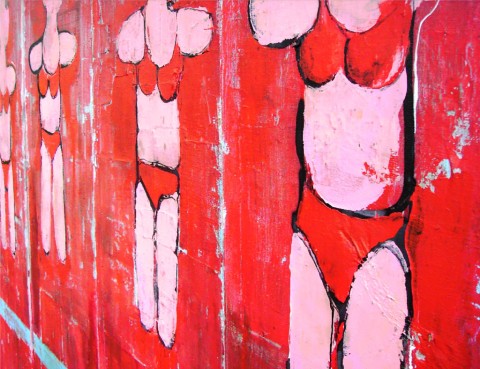The lady leans over the boy and the boy pushes himself back into his hole in the sand and he is so frightened he pees in his trunks. The lady wears cat’s eyes sunglasses and she smiles but has no eyes. What’s the matter honey?, she says, You’re lost? Where’re your folks?
The lady shows her teeth and reaches a hand down to the boy but the boy flinches and pushes deeper into the sand, gets sand up his nose and in his mouth. He has been digging for hours, the hole is quite deep, the sand dark, moist, cold.
The lady straightens up and peers around and the boy peeks out of his hole. The beach is not crowded now and around them people pack up their blankets and towels and baskets. The tide has let out; when the boy had started digging his hole the ocean had been right there but now it is far away. The boy, who knows nothing about tides, believes he has dug too far and he is somewhere else entirely and now he is really frightened, too frightened to speak.
Hello!, the woman calls out, whose child is this? Does anyone know whose child this is?
This brings a crowd. People holding beach bags and folding chairs and umbrellas press in around the boy in the hole. They gaze down at him the way one looks at the body of some strange animal, washed up on the beach, abandoned by the tide.
A bald-headed man with a cigar walks up. He wears a shirt with a terrycloth collar and the buttons undone so that the shirt flops in the breeze against a big round hairy belly. His legs are skinny and he looks like a bird. The birdman says: Who leaves a kid alone like that? Hey kid, you got a name?
Now the boy is so frightened he can’t remember his name. He shivers but not because he is cold. More people join the crowd around the boy in the hole.
Everyone is tired and hungry and thirsty from the long afternoon in the sun and burdened by towels and pails and shovels and ice chests and sunburn; they grow impatient. Some of them leave the crowd and pretend to look about for the boy’s parents then quicken their pace and slink off, over the low dune to the parking lot. The lady crouches down and reaches into the hole. She wears a pink bathing robe and under that a dark one-piece suit that bunches up and shows part of her bosom. She reaches to the boy who shrinks away. It’s all right honey, she says in a softer voice, We won’t hurt you.
The birdman with the cigar had stepped away but now he comes back. We ought to bring him to the lifeguard station, he says, What do you say, kid? Bet your folks are looking for you there.
The lady reaches for the boy and her fingers are warm on his skin and he lets her catch his arms and draw him up out of the hole in the sand. The lady brushes the sand from the boy, her hands are brisk but she is more careful near the eyes. The birdman is somewhat shorter than the lady but broader and his skin is covered in hair, more feather-like than furry. He chews on his cold cigar and watches the lady and the boy but mostly the lady. The rest of the crowd, seeing that the boy has been taken in hand, drifts away. The birdman says, Who just leaves their kid like this? It’s these damned times.
The boy shivers and the birdman takes off his shirt and places it over the boy’s shoulders. The lady smiles at the birdman and takes the boy’s hand and tugs him along over the hot sand. The birdman steps out in front of them to lead the way.
At the lifeguard station the birdman takes back his shirt. A lifeguard brings the boy a sweater from the lost and found and a candy bar. The birdman and the lady get to talking, they discover they’re staying in the same hotel, he’s a widower, she has never been married, he owns a movie theater, she’s a librarian, etc. The lifeguard station is painted white but the paint has faded in the salted air, reveals the silvery wood below. The radio is on and after a song or two the music stops and the president speaks to them about war. These times, the birdman says, and the lady stands a little closer to him. A seagull flies in, watches the boy eat.
They all look out over the beach and the sand covered in footprints.
The lady had been thinking she’ll give the boy’s folks a good scolding when they come but she is becoming a bit bored with the boy, really, it’s impossible to get a word from him. Still, when the birdman invites the lady up to the boardwalk for a drink, she hesitates. Don’t worry, the birdman says, Bet they’re already on the way.
On the bench the boy looks out to sea and swings his legs, back and forth, back and forth. What do you say? the birdman says.
She takes his arm and smiles. We’ve done a good thing, the lady thinks and she is suddenly light as if flying on the birdman’s arm, the normal thing, yes.



 The SmokeLong Grand Micro Contest (The Mikey) is now an annual competition celebrating and compensating the best micro fiction and nonfiction online.
The SmokeLong Grand Micro Contest (The Mikey) is now an annual competition celebrating and compensating the best micro fiction and nonfiction online.